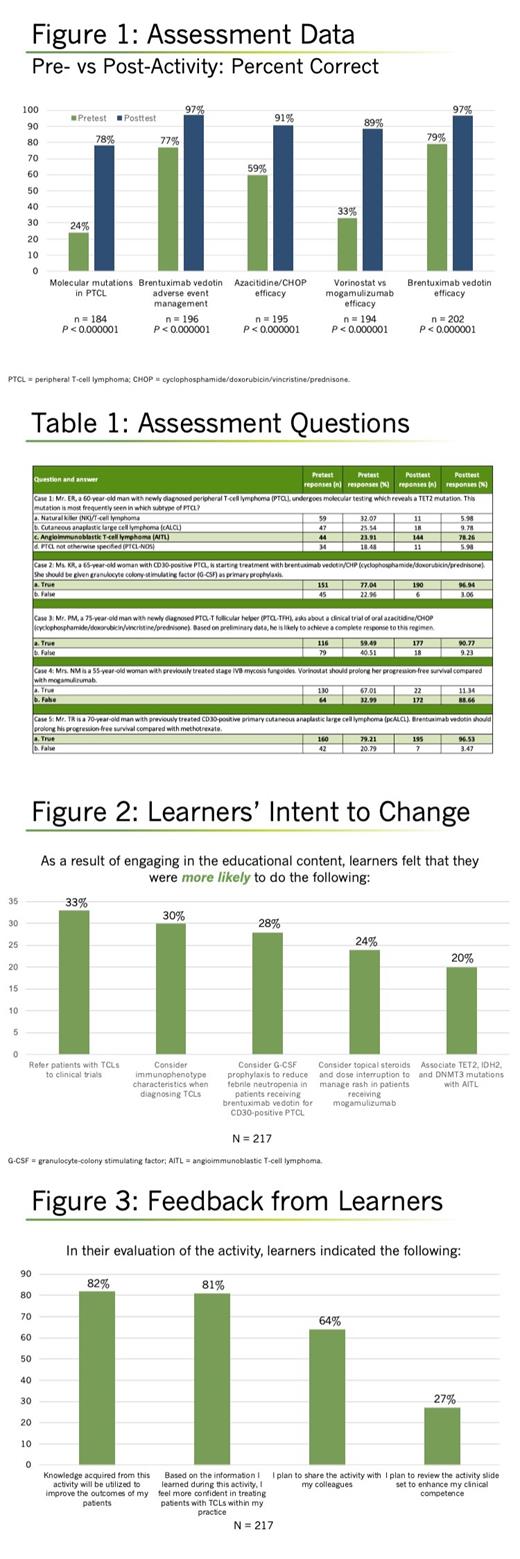Abstract
Background: Therapeutic advances have made the treatment of T-cell lymphomas (TCLs) more effective, less toxic, and more individualized, but research indicates that the multidisciplinary team faces challenges in maintaining a working knowledge of evolving data that can inform clinical decision making. This study was conducted to determine if an online, case-based continuing medical education (CME)/nursing continuing professional development (NCPD) activity could improve clinicians' skills regarding the individualized treatment of patients with TCLs. The educational intervention was intended for all members of the multidisciplinary team: hematologist-oncologists, oncology advanced practitioners and nurses, and other health care professionals involved in the treatment of patients with TCLs.
Methods: The CME/NCPD-approved live webinar series titled Update on Therapeutic Advances in T-Cell Lymphoma was presented on March 11, 2021 and March 15, 2021, and was made accessible as a CME/NCPD-approved enduring webinar archive starting on March 18, 2021. Learners participated in a 1-hour online activity regarding current challenges and emerging opportunities in the management of newly diagnosed and relapsed/refractory TCLs. The presentation highlighted mechanisms of action, efficacy, and tolerability of newer therapeutic agents, along with adverse event management strategies. Learners engaged in active learning during case studies that explored patient and disease characteristics that inform care, risk stratification, and treatment.
Prior to the activity and following its completion, learners were given a repeated pairs pre- and post-activity assessment consisting of case-based questions that gauged their ability to apply emerging data and guideline recommendations to clinical decision making. Each learner served as their own control. The percentages of learners obtaining correct responses on the pre-activity assessment were compared to those on the post-activity assessment using a chi-squared test. Additionally, learners completed an evaluation of the educational content and self-reported the influence that they judged the activity would have on their future practice.
Results: As of July 29, 2021, 218 clinicians had completed the activity for credit. Online education had a significant impact on gains in knowledge and competence in the selection of personalized treatment for patients with TCLs (Figure 1). Learners demonstrated substantial improvements in knowledge of the superior efficacy of mogamulizumab versus vorinostat for a patient with previously treated stage IVB mycosis fungoides (55.67% mean improvement on the post-activity assessment, P < .000001); of the association of the TET2 mutation with angioimmunoblastic T-cell lymphoma (AITL) (54.35% improvement, P < .000001); of the predicted efficacy of oral azacitidine/CHOP (cyclophosphamide/doxorubicin/vincristine/prednisone) for an older patient with peripheral T-cell lymphoma-T follicular helper (PTCL-TFH) (31.28% improvement, P < .000001); of the appropriateness of granulocyte colony-stimulating factor (G-CSF) prophylaxis for a patient with CD30-positive PTCL commencing treatment with brentuximab vedotin/CHP (cyclophosphamide/doxorubicin/prednisone) (19.90% improvement, P < .000001); and of the superior efficacy of brentuximab vedotin versus methotrexate for CD30-positive primary cutaneous anaplastic large cell lymphoma (pcALCL) (17.33% improvement, P < .000001). The case-based assessment questions and answer choices can be seen in Table 1. Learners' responses on the activity evaluation can be seen in Figures 2 and 3.
Conclusions: These data indicate that online, case-based CME/NCPD-approved activities can result in statistically significant improvements in clinicians' knowledge of therapeutic advances and can increase their sense of competence and confidence in personalizing treatment plans and managing treatment-related adverse events for patients with TCLs.
Acknowledgements: This activity was supported by independent educational grants from Kyowa Kirin and Seagen.
Horwitz: Affimed: Research Funding; Aileron: Research Funding; ADC Therapeutics, Affimed, Aileron, Celgene, Daiichi Sankyo, Forty Seven, Inc., Kyowa Hakko Kirin, Millennium /Takeda, Seattle Genetics, Trillium Therapeutics, and Verastem/SecuraBio.: Consultancy, Research Funding; Acrotech Biopharma, Affimed, ADC Therapeutics, Astex, Merck, Portola Pharma, C4 Therapeutics, Celgene, Janssen, Kura Oncology, Kyowa Hakko Kirin, Myeloid Therapeutics, ONO Pharmaceuticals, Seattle Genetics, Shoreline Biosciences, Inc, Takeda, Trillium Th: Consultancy; Celgene: Research Funding; C4 Therapeutics: Consultancy; Crispr Therapeutics: Research Funding; Daiichi Sankyo: Research Funding; Forty Seven, Inc.: Research Funding; Kura Oncology: Consultancy; Kyowa Hakko Kirin: Consultancy, Research Funding; Millennium/Takeda: Research Funding; Myeloid Therapeutics: Consultancy; ONO Pharmaceuticals: Consultancy; Seattle Genetics: Consultancy, Research Funding; Secura Bio: Consultancy; Shoreline Biosciences, Inc.: Consultancy; Takeda: Consultancy; Trillium Therapeutics: Consultancy, Research Funding; Tubulis: Consultancy; Verastem/Securabio: Research Funding.


This feature is available to Subscribers Only
Sign In or Create an Account Close Modal